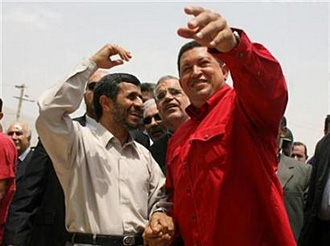 |
 |
 |
 Editorials | Issues | September 2007 Editorials | Issues | September 2007  
Latin America Draws US Candidates' Attention
 Pablo Bachelet - McClatchy Newspapers Pablo Bachelet - McClatchy Newspapers
go to original


| | Iran's President Mahmoud Ahmadinejad (L) and his Venezuelan counterpart Hugo Chavez (R) attend a ceremony to open the Borzouyeh petrochemical complex in Asalouyeh Seaport, 900 km (560 miles) southwest of Tehran July 2, 2007. Iran is gaining influence in Latin America as the region turns away from Washington and President Ahmadinejad courts new allies to counter U.S. efforts to isolate his government. (Miraflores Palace/Reuters) |
Washington - It has become an article of faith for U.S. presidential hopefuls: If elected, they would give Latin America the attention it deserves.

Among Republicans, Mitt Romney pledged to "rebuild relationships of trust," while Sen. John McCain said Latin American nations are "natural partners of the United States."

Democrat Bill Richardson wants to resurrect the Kennedy-era Alliance for Progress, while rival Sen. Barack Obama promises a listening tour, starting with a visit to Bolivian President Evo Morales, who has criticized President Bush. Such words are a welcome development for a region that largely sees Bush as too distracted by the war in Iraq to reverse the drop in U.S.-Latin American relations.

"Latin Americans are looking with a certain degree of enthusiasm for a new administration in Washington," said Peter Hakim, who heads the Inter-American Dialogue, a Washington think tank.

Few new proposals

Peel away the presidential hopefuls' lofty words, observers say, and you'll find few substantive proposals on issues that matter the most to many Latin American governments: treatment of immigrants and access to the U.S. market. Instead, there is plenty of fiery rhetoric condemning anti-U.S. leaders like Hugo Chavez and Fidel Castro - but few proposals that deviate substantially from what the Bush administration has done.

Hakim argued that Latin Americans should be "cautious" because presidential candidates are not pushing an agenda that suits them on trade and immigration. Bush, he added, has been friendlier on issues such as comprehensive immigration reform, a reduction in farm subsidies that anger Brazil, and free-trade pacts with Peru, Panama and Colombia.

States with large Hispanic populations are moving up their presidential primaries and foreign policy is becoming a key debating point, so Latin America is receiving more attention than usual at this point in the race.

McCain delivered a Latin America speech in West Palm Beach, Fla., in June in which he pledged to re-create the defunct U.S. Information Agency to improve Washington's diplomacy outreach.

Romney, a former Massachusetts governor, has tried to show his interest in Latin America by putting out statements for the national days of Peru, Colombia, Cuba and Venezuela, speaking in favor of free trade and condemning Chavez and Castro. He has also announced high-profile campaign advisers, including Al Cardenas, a Miami Cuban-American and former head of Florida's Republican Party, and Mexican-American Roger Noriega, a former assistant secretary of state for the Western Hemisphere.

On the Democratic side, former White House chief of staff Thomas "Mack" McLarty describes Sen. Hillary Clinton as an "engaged internationalist" who, as first lady, visited 17 Latin American countries.

Connecticut Sen. Christopher Dodd, chairman of the Western Hemisphere subcommittee of the Foreign Relations Committee, speaks fluent Spanish and has met with 49 heads of state from Latin America and the Caribbean since 1987, according to his campaign.

Richardson, the New Mexico governor who was born in Mexico and speaks nearly fluent Spanish, is a special Organization of American States envoy to Latin America on immigration issues. Besides reviving Kennedy's Alliance for Progress, he says, he would move key government agencies to Miami because of its nearness to Latin America.

Domestic pressures, too

While the candidates may know and talk about the issues that matter most to Latin Americans, they also face the pressures of domestic political considerations.

Immigration can be a toxic issue for Republicans because many conservative voters are angry over a perceived flood of illegal immigrants from Latin America.

Democrats, for their part, are reluctant to tackle free trade because their organized-labor partners oppose it. Former Sen. John Edwards has blasted pacts like the North American Free Trade Agreement for having "devastated towns and communities across this country." Clinton and Obama say they favor free trade but opposed an agreement with Central America and the Dominican Republic in 2005, saying that it lacked sufficient provisions to protect workers and the environment.

Dealing with leaders

All candidates condemn Castro and Chavez, but there are some cracks on how to deal with them.

Obama and Richardson favor allowing more family travel to Cuba. Obama caused a stir when he suggested that under "certain conditions," he would meet with U.S. foes like Chavez or the Castro government. "Sometimes it is more important to talk to your enemies than to your friends," he told Andres Oppenheimer, a columnist for The Miami Herald. Then he wrote an opinion piece in the Herald saying he would allow more family travel and remittances to Cuba and held a well-attended rally in Miami's Little Havana on Aug. 25.

Hillary Clinton criticized Obama's positions as "naive," but Obama is hardly alone in that stance. Clinton herself has voted in favor of bills that would have relaxed restrictions on travel to Cuba.

Dodd, in a statement to The Miami Herald, said, "We need to open up channels of communication with all sectors of Cuban society, including with Cuban government authorities."

Richardson said he is "a believer in negotiations" without preconditions. He wants to lift the U.S. embargo if Cuba frees political prisoners and agrees to "negotiated democratic reforms" - without going into specifics. | 
 | |
 |



